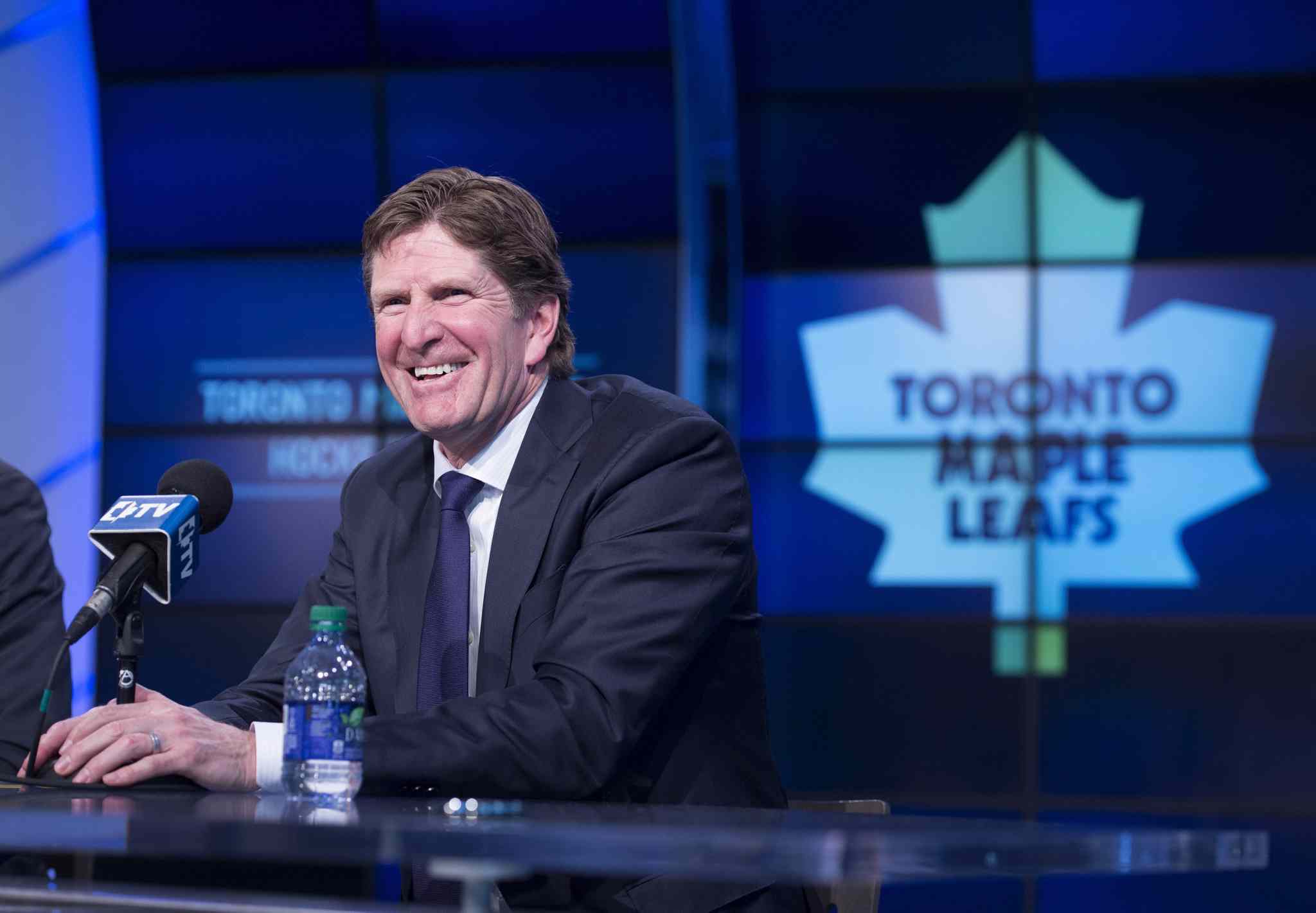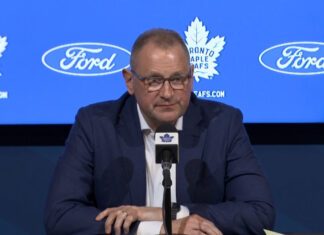The big three in Maple Leafs brain trust – Brendan Shanahan, Lou Lamoriello and Mike Babcock – take questions from Paul Hendrick and season ticket holders at the annual “Town Hall” event prior to the opening of training camp.
Paul Hendrick: It’s one of the most passionate hockey markets in the entire world. These fans are the most passionate. How do you temper their passion, and the organization’s passion, by bringing in patience, which might be needed in the beginning?
Lamoriello: I think the most important thing is having a plan. I think that Brendan has set that plan. Brendan was right up front with his thought process and what he felt is necessary to have success. I think it’s taking a step at a time. You always have a vision that’s a little idealistic, but you approach everything realistic. I think Mike coming here and what Mike brings immediately with reference to the on ice product and the patience that all of us will have to have. We’re three impatient people, too. What we’re going to have to do is make sure we stay on course, support each other, and never allow anything to get in between the three of us, whether it be the media or the fans, to have that vision to get this done.
Hendrick: The organization has five first round draft picks 21 years of age or younger. It starts with Morgan Rielly and works its way down to Mitch Marner. You’ve got to be excited, as we head to London for the weekend, to see some these younger kids and what’s in store for the organization going forward.
Babcock: For sure. Hopefully the future with those kids is bright. In that way, we’re going to have to continue with Mark Hunter and the way we’re set up for the draft to stockpile kids. In saying that, though, our focus is on the group here now. We’re going to get to know each other a lot better here in the next little while. We have to build a plan on the ice so we can have some success, but I think the biggest thing here for our group to understand where we’re going is we want to be real good pros, we want to determined, we want to play hard, we want tot be organized, and we want to have a lot of fun. In order to do that we have to all be in it together. I don’t question our group in that way at all, but we have a lot of work to do. It should be fun.
Fan: This is actually directed to Lou and Brendan. Earlier in the week, Cody Franson decided to sign with the Buffalo Sabres. I was wondering if you guys would have any insight as to why he opted for Buffalo over Toronto.
Lamoriello: Certainly, whenever this time of the year comes – July 1 – you certainly look over each and every one of the free agents. With the plan that you have, you see whether the player fits in or not. Now, in a new world we live in in the cap world and the commitment you want to make to an individual, I think with the younger players we have here – not that he’s not a young player – but I think that we decided to go in the direction that we’re going. Not anything against this gentleman. By the way, we shouldn’t even be talking about him because he belongs to another organization.
Hendrick: From coaching on through to management, there are so many divergent personalities in this group. How lively are discussions if you guys get together and perhaps not necessarily always agree as to how to achieve success. Are those meetings pretty interesting?
Shanahan: Well, I didn’t go after quiet, non-opinionated guys. I think in any successful team and organization it’s about having honest people who respectfully voice their opinions. It’s about having a diverse group of people as well, not just a bunch of guys who agree with each other. Lou’s right; nobody is going to come between the three of us. We don’t agree every day, but we respect the fact that we don’t agree at times. I think that that’s how it’s going to work. We have a bunch of people within organization that are very determined and have strong opinions and strong voices, but are team players. That’s the big difference here. To me, I know some people that have strong opinions that aren’t necessarily team people. I also know gentlemen like the ones to my right who have strong opinions but are team first. Like Lou said, we’re an impatient trio. That being said, we understand the vision and the plan that’s going to unfold. Nobody should make any mistake. The players that have committed to play for us this year — we’re going out to win. We’re going out to play hard, prepare hard. Mike is going to make sure that every detail is looked after. Nobody is laying down here. These guys are going to go out and play hard every night. We’re going to make sure that some of the things that have happened in the past are going to be eradicated from this hockey club, and that his is going to be the kind of hockey club that this city deserves, our fans deserve, and quite frankly our players want; our players want to play on a team and an organization. I think we’ve got two guys that are going to protect them and do their job and make sure we’re prepared every night.
Hendrick: Mike, that means players that are as passionate as these fans are. Not hard to attract that and not difficult to get these guys motivated to play in a market like this for the passion Leafs Nation brings to each and every game.
Babcock: I think it’s a fantastic thing. Any time you’re in Canada in general, there’s a tonne of passion for hockey to say the last. When you’re in a place like this, it’s very, very special. We’re an original six franchise and I think that’s a special, special thing. NHL is great; original six, I think, is better. But we have to hold our rightful place in the NHL. In order to do that, we have to improve the product on the ice. That’s going to take some time, but we’re going to do that. I fully believe that if you think you can, you can. I’ve been impressed with our guys thus far. We’re going to take steps, like Lou said, on a daily basis to get to where we want to be. It’s great to have passionate, knowledgeable fans that understand the process and understand what’s coming, and understand that we’re all in it together.
Fan: I wonder what the plan is for the rookies and draft picks. Will they be called up, or spending a year with the Marlies?
Lamoriello: First of all, we have to see where they are at in their career. We believe in a development process. When I say development process, I mean you take things in steps. No different than a young child; before he or she walks, they crawl, and before they run, they walk. We have to see where they’re at in their stage of development, but the one thing I’ve learned a long time ago is that it’s better to bring a player up too late rather than too soon. We want these players and these young players to have a long career, and not just something that’s a flash in the pan. We’ll give them every opportunity to develop. They’ll tell us when they’re ready; we won’t have to tell them.
Fan: This question is for Mike. I was thrilled when you were signed on, and glad you’re here for a minimum of eight years. I need a bold prediction from you. In what year are you bringing the Stanley Cup to Toronto?
Babcock: That’s a really good question. The way I look at it is: When you want to build a real good team, you want to have a real good product, and when you have a good product that team usually has about a ten year run. Lou has had that ten year run in New Jersey, we had a really good run in Detroit. You build up the players and you give them an opportunity to have success. We always talked in Toronto – you knock on the door you knock on the door, and eventually the door opens. Just because you have a great team one year, it doesn’t mean you’re going to win. You get injuries and lots of things can go wrong. What we’re going to do here is we’re going to build a product where we go into training camp each year knowing we’re going to be in the playoffs and knowing that we’re going to have an opportunity at the end. Lots of times, when you take over a new business, some times it takes twice as long as you think and it’s twice as hard as you think. It’s going to be hard. Our players are in for that; they understand that totally. That doesn’t mean we aren’t going to compete hard and try to win each and every night, but we understand we’re in a competitive league and we’ve got a ways to go. Step by step, we’re going to get better.
Hendrick: Brendan, you look at this team, the organization – there is a core of Ontario born players. There could be seven, eight possible players on the Leafs this year [from Ontario]. Is geography important when it comes to instilling passion to play in the Blue and Whtite? Ontario is a good start, but is it totally important?
Shanahan: First off, the only thing I really heard in that last answer is Mike has an eight year contract but he wants a two year extension. Look, to me, geography.. we want to have the best players here. It doesn’t matter where they’re born. I think it’s great to have a guy that is from this area and certainly has an appreciation for what it means to be a Leaf. We’ve certainly seen some guys make an effort, and we have some guys we’re going to hear from tonight, that are local guys who had an opportunity to play in another market for more money, for more term, that have chosen to come home and play for their beloved Leafs. I think that, at the end of the day, it’s an important thing, but we want to have the best players, and I don’t acre where they’re born. Certainly, you just have to – as I said at the end of the season – you have to have a feeling of love and appreciation for being a Leaf. I want to see that more often from our guys and the guys who have a privilege of wearing that sweater.
Fan: In Detroit, you implemented a puck possession system. I’m just wondering if you plan to implement that in Toronto? And if so, how long do you think it will take?
Babcock: That’s a great question. The better players you have, the more that you have the puck. That’s reality right there. What we’re going to implement here is going to be a lot of fun for our players. We’re going to work very, very hard to play defence fast so we’re on offence. I think that’s the whole key to having success. I’m excited to have some of our guys on the backend; I think they can really skate. I think we have a lot of veteran guys who have signed for our team who work hard and compete hard on a nightly basis. I think we can be a fun team to watch and a hard out on a nightly basis. We’re going to implement a good plan in training camp so we understand exactly how we play. To me, I think it’s real simple: Structure protects the individual and structure allows your skill to come out. We’ll be a structured, hard-working team that makes our fans proud.
Fan: In regards to a statement you made the other day in the paper, “tie goes to the veteran.” With the kids at rookie camp right now, for those guys in a tie situation, is that a top-two line scenario relative to a third, fourth line? Because you mentioned not just making the team, but helping the team. Typically a rookie could play third-fourth line, but do you really want that?
Babcock: I think that’s a real good question. What I mean by “tie goes to the veteran” is real simple. These guys here, I don’t know who they are. I mean, I know them, I’ve coached against them, but I don’t know who they are until I get to coach them. We’ve got to give our veteran guys to show us what they can do. In the meantime, if you’re a young guy and you want to play on the Leafs? Just take someone’s job. It’s real simple. Just make sure we can’t keep you off the roster. Exhibition games are played at one level, the first ten games are played at another level, and the season goes better and better. A lot of the veteran guys sitting here will tell you that each year there is a flavour of the year at training camp. He gets put in and he gets all these opportunities, and then ten games into the season he doesn’t play anymore. Let’s just find out what we have. Let’s build these kids into the kind of pros they’re capable of being. Let’s make them earn their job. Nothing here is going to come for free. You’ve got to earn the opportunity to be a Leaf.
Hendrick: Lou, when you look at the cap era system, can you place a perspective on the heavy lifting that your amateur scouts and their staff have to do over the course of 12 months to really get it right at the draft come the end of June?
Lamoriello: There’s no question. That was one of the things that was really attractive to me coming here – Mark Hunter. In my opinion, he’s one of the best, if not the best. In order to get good players you have to have somebody who has a good eye and what he’s done with the scouting staff. He’s done that, and we can see that just with the prospects here today and where they were yesterday. I’m with Mike; if a young player wants a job and wants to stay, he should take it away from somebody else and make people not want to let him go anywhere. It’s going to be up to the players.
Fan: My question is this – the biggest transaction in the offseason was the trade of Phil Kessel. There is sometimes a term that is addition by subtraction, so your team is improving by getting rid of a certain player. Would you say that the overall character image that is portrayed to the fans has been improved as a result of the trade of Phil Kessel, notwithstanding his goal scoring prowess? What would you say about that? Lou, maybe you want to take the first crack at that.
Shanahan: I’ll jump in here because Lou wasn’t a part of the Leafs when the trade was made. Going back to what Lou said earlier – there is a certain amount we can’t talk about other team’s players. He’s a very talented player, and we expect him to have a very good season. We had to make certain decisions. We have guys we’re going to count on and rely on. As far as the judgment of addition by subtraction, or anything like that, in the fans’ eye… That will be really up to you to decide. We have an opportunity here now, we have some challenges because of the way he scored goals, but the way I was always taught when I was a younger person – when somebody was moved out, that was the opportunity for someone else to step in, whether it’s a veteran player, one of our guys who has been around here a while, or a rookie player. That role is not going to be given to anybody. Somebody has to step up and take that.
Hendrick: Competition – you’ve brought some players in on PTOs, what can veteran players like Brad and Curtis bring in terms of pushing the younger guys given all the experience they’re going to bring to camp beginning in Halifax next week?
Babcock: I just think the more talent you have, the more competition you have, the more you find out about one another. To me, the tougher the situation gets, the more you learn. That’s what you’re trying to find out in camp. I want to have the best camp you can have. We’re going to start in Halifax for a few days and build some structure and work ethic and figure out how we’re going to play. There will be three scrimmages there. We’ll narrow the group there down to two teams; basically, everyone is going to get an opportunity to play around four exhibition games. We’re going to evaluate our group. In the end, we’re going to end up with the best team we can possibly have here for the Leafs. That’s the process. The more competitive that is, the better opportunity it is for the players to compare themselves to good players, but also for the management and the coaching staff to see actually what we have.
Fan: This is mainly directed to Mike. Since you’re going through a rebuild, how do you balance a winning mentality and the aura that a rebuild brings to the dressing room?
Babcock: I don’t think the players are going through a rebuild at all. I think the players are doing everything they possibly can to perform each and every night. I don’t think the coaching staff is going through a rebuild; they’re going through each and every thing they can do to win each and every night. I think the management team has a long term look at where we are and where we have to go and they make the best decisions for the organization. Our job as players and coaches is to maximize the potential of the group. I can tell you this – there is nothing that upsets me more than lack of preparation or lack of compete. When I walk out of the building each night, I’m no different than the players. I want to hold my head high. I want to go home, I want to talk to my wife and have a glass of wine, and come in the next day. I don’t want to go home and not sleep good and worry about how the team played because we didn’t compete. To me, the competition level of your team is something you can control. The structure of your team is something you can control. That’s my job and that’s the players’ job. Shanny, Lou and our scouts can look after the rest of it.
Hendrick: Brendan, the AHL is the best development league in the world. How valuable are the Toronto Marlies and that organization in developing the players for what you want to see here moving forward?
Shanahan: We feel extremely luck not only to have the Toronto Marlies, but to have them nearby and also have them so close to Lou, to Kyle Dubas, to Mike Babcock and his staff. To bring in a guy like Sheldon Keefe, who was the CHL coach of the year; it’s a development league, but I also think there’s also something to be said about developing coaching. I know Sheldon really looks up to Mike. Ther’es going to be great communication. Mike is going to serve as a mentor for him. Look, when the season gets started, Sheldon has a very busy job and Mike has a very busy job. I can tell you right now that we want the guys that are playing for the Marlies, if and when they’re needed to come up and play for the Toronto Maple Leafs, for there to be a seamless transition. The communication that Mike has had with the coaching staff has been phenomenal.
Babcock: What we’ve done with Sheldon and the coaching staff on the Marlies, and our staff — we’ve been working together, pretty much going through our whole program for the last week and a half. We’ve talked a lot through the summer, but now that we’ve built a program and we’ve gone through it meticulously so that we get better at presenting it so we’re ready to present to our players, but also that [the Marlies staff] learn and they’re getting ready to present to their players. We all understand how we’re going to play as an organization. In the end, they’re trying to win each and every night down there, but we want to play a certain way to give ourselves the best opportunity. We want that to be right through the organization.
Fan: It’s been a difficult couple of years. What can you say to the fans to give hope and ‘beleaf’ again?
Babcock: If you’ve been following the Leafs this summer – this is just me, and this might sound self serving – I think the Leafs have had a real good summer. I think we’re real fortunate to play in a great city with knowledgeable, knowledgeable fans that understand that as well. We’ve started a direction and we’re going to stay with it. There’s going to be some bumps in the road like there always is in life. Those are just opportunities to get better and we’re going to dig in. We’re sticking to the pan. You can be rest assured of that — that we’re sticking to the plan and this is going to get looked after. For us to tell you it’s going to take a certain amount of time — I don’t think any of us know how long it’s going to take, we just know we’re going to get it done.
Shanahan: We’ll make our mistakes like all clubs. The other 29 teams, because they’re not in Toronto, are not stupid, they’re [not] not-well funded, and they don’t lack passionate fans. It is hard to win in the NHL and we understand that. These guys have to my right have Stanley Cups. I do want to say this to our fans: I understand that it has, for a lack of a better term, sometimes been difficult to be a Leafs fan despite the fact that we have more fans than anybody else in the world in hockey. We will have bumps along the road. Not everything is going to go perfectly. We will have difficult nights. We will have difficult stretches. I say this, and I mean this: Be very, very proud to be a Leaf fan. Do not be embarrassed to be a Leaf fan. Our players are going to work hard, our staff is going to work hard, we are going to get this done. We are not going to quit. That is not boastful. We know it is not easy, but we will not quit. Be proud, hold your heads high, and we will try to make you proud as well.
Fan: I’m a big believer in the Roger Nielsen theory that a good coach can make a difference. You’ve started your coaching career at University of Lethbridge and very quickly made something out of nothing into a championship team. Do you believe you can do that here, quickly?
Babcock: I actually started my coaching career at Red Deer College. Anyway, this is what I’ll tell you: Our plan is just like it was at Red Deer College, or at Moose Jaw, or at Lethbridge, or Spokane or Cincinnati or in Anaheim or Detroit. It’s to maximize the group. That’s what we’re going to do here and then we’re going to see what happens. We’re going to be a group you can be proud of and we’re going to get better.
Hendrick: Lou, we’ve talked about the management team; we haven’t talked about Jacques Lemaire tonight. Tell me about Jacques Lemaire — the man, the coach, what he’s going to bring to this organization, whether it be with this club or down the road at Ricoh Coliseum with the Marlies.
Lamoriello: First of all, Mike and I were having a conversation — Jacques was with me in New Jersey as you know for many years — and Mike asked me what Jacques was doing. I said I thought he would not be staying in New Jersey and that he was talking to some organizations. Mike said, “what are you doing talking to me?” I said, “what are you saying?” He said, “why don’t we have him?” I said, “call him.” So, Mike called him, and sure enough Jacques is here. Both of us, Mike and I and Brendan also, have all had a relationship with Jacques in a different way. He is an unassuming individual, one who is completely competitive and wants to help… Jacques Lemaire made a decision – and he could’ve gone many places – to come here and his excitement to be part of what’s happening here and be part of Mike’s group. That says a tremendous amount for Toronto. I know why I’m excited. To see him as excited, and he’s been here this week, I’ll have Mike elaborate on it, but he’s going to be an asset I think to Sheldon and he’s just an individual who has tremendous hockey knowledge, and he’s not afraid to say what he believes. Mike trusts him, he trusts Mike, and he told me, in his opinion, that Mike is the best coach in hockey that he has seen.
Fan: I just wanted to know, since you guys have hired so many new upper management [personnel] this year, a lot of similar roles and a lot of great hockey minds together, who is going to make the game day decisions when it comes to the team?
Babcock: I think what happens when you have a team is the President makes the decisions he’s supposed, the manager makes the decisions he’s supposed to, and the coach makes the decisions he’s supposed to. When you’re making those decisions, we’ve all got feedback in all those situations. What I mean by that is Lou and I talk every single day. When the game is on, and I decide who is playing, when the game is on I’m making those decisions. When we go to trade a player, when we go to acquire a player, Lou’s talked to me in advance, I’ve talked to Lou, and in the end he’s got to make that decision. I think what happens is different people are making different decisions at different times, but we all have input. That doesn’t mean we all agree all the time. In the end, the coach coaches, the manager manages. That’s the way it works.
Shanahan: It’s important to know we have a tremendous amount of respect for each other. If I’m going to make a decision, I want to know what Lou thinks, I want to know what Mike thinks, and I want to know what Brandon Pridham thinks. We trust each other; we trust the privacy of one another, but we also know, like Mike said, we all have different jobs. It doesn’t mean we don’t want to lean on each other, but at the end of the day, Mike is on the bench and I can’t change the lines. We all have our own jobs to do. I think that it’s going to work very well. I have absolutely no concerns whatsoever about this group that we’ve put together.
Hendricks; I want to talk about the upcoming World Junior championships. We might see possibly five members of the organization playing at the World Junior championships. How valuable is that as a building block toward the future?
Lamoriello: I think that any time a player has the opportunity to play in a championship game and to feel the pressure that comes, the pressure that he puts on himself to have success, and to play with great players, they can only get better. Any time they have that opportunity, and to have your players there, is special, and it’s something you look forward to.
Fan: The Toronto media can be very scrutinizing at times. My question is what advice do you give to players to handle that amount of pressure?
Lamoriello: What you tell the players – simply be honest, tell the truth, be there during the good times, be there during the bad times. Never hide from anything, and you’ll gain the respect of the media and, more importantly, you’ll gain the respect of the fans. Face what it is. If you make a mistake, you say you did. Don’t hide behind anybody, and stand up for your teammate.
Fan: How do you combine the success Kyle Dubas had in the O with the success you gentlemen have, and what’s your play on his experience and your experience and how do you see that going forward?
Shanahan: You’re being severely photobombed, by the way, by some very excited kids behind you. One of them looked like Kyle. I’ve gotten to know Kyle over the last year; I didn’t know him before last year. I just think he is a hard-working, incredibly bright and gifted hockey person. He comes from a different generation. When I first got hired and somebody started talking to me about analytics and data and things like that, ironically what a lot of people don’t know is I sort of went to two different people and asked them what it meant. One was Kyle Dubas and that meeting was set up through David Branch. One of them, ironically — and it’s a bit of a secret but I’ll tell it now — was Lou Lamoriello. Lou is sneaky smart and sneaky nimble when it comes to information. He is a baseball man as well. These two guys to my right have gotten to know Kyle. He’s a very humble, hard-working guy. I just think there’s a great opportunity for him to be able to learn from a lot of people as well. What I like is, when he’s in a room – I’ve heard the expression once before and should probably heed it more often; you’ve got two ears and one mouth, you should listen twice as much as you speak – and certainly Kyle is listening to these guys and learning as much as he can.
Fan: As you go forward, what is your plan to recruit superstars to Toronto?
Shanahan: I think that, first and foremost, we have to worry about what we have here. We have to worry about how he draft, how we develop. This is not the era, again, where teams can build themselves and rely solely on free agency. If and when there’s a player we want in free agency, I will be just as vocal and give everyone as much as a heads up as we did when we hired Lou and Mike, which is zero. Look, we have to take care of ourselves right now. As Mike said, Mike is worried about today and Mike is worried about tomorrow. Guys like Lou and myself, we’re always thinking about today but we’re also thinking about next week, next year, three years from now, five years from now, the future of the organization. When there is a player that we want, if a player is available and we think that he can help our club and it makes sense, we’re certainly make our best effort.

































